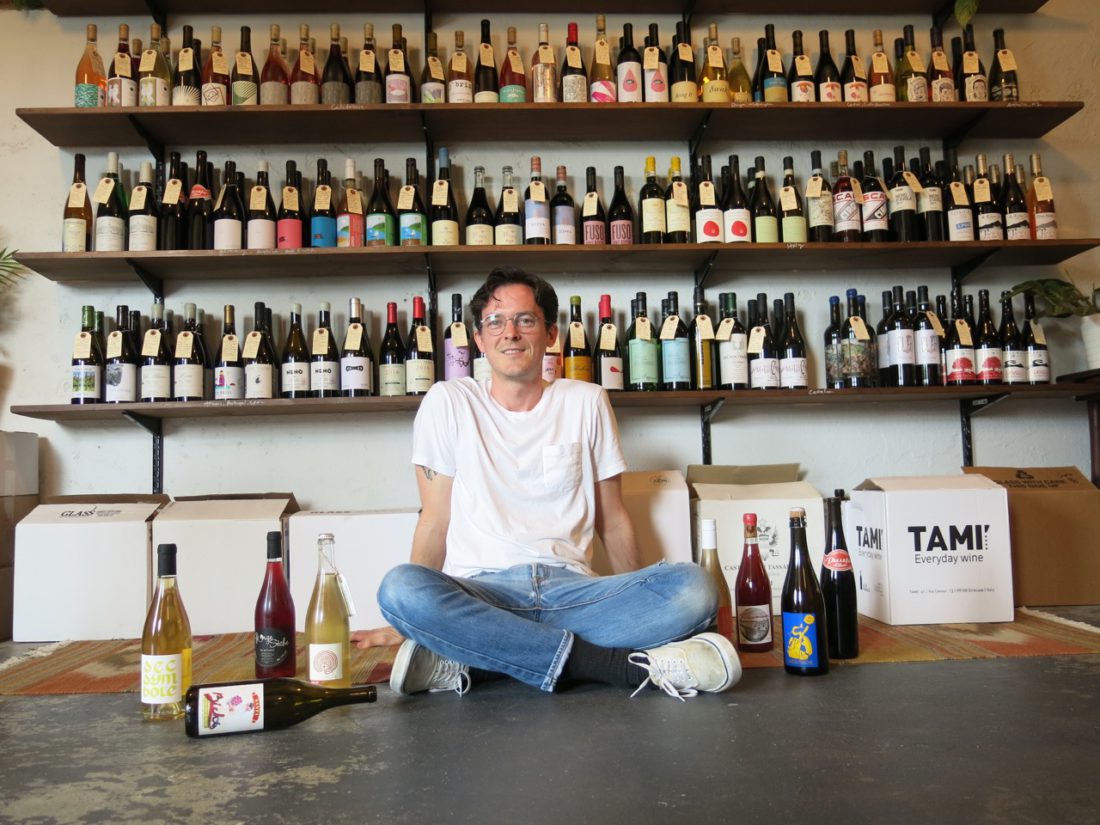Walk too fast down Biltmore Avenue past Manicomio Pizza, and you just might miss one of the most unconventional wine shops in the state. “I’m not allowed to have any signage on Biltmore,” says owner John Hale, who opened Crocodile Wine in December. “Foot traffic is tricky, but I’m not really chasing it.”
Located in the lower courtyard under Manicomio Pizza, Hale’s basement shop is gleefully obscure, in part due to its unique inventory. Crocodile Wine only sells natural wines — in fact, it’s the only wine shop in North Carolina that does so.
Even to the novice wine drinker, the bottles that line the shelves at Crocodile look different. The labels are artful and eclectic; the color of the wine is at turns luminous and opaque. “Some of these white wines are really wild and funky,” says Hale. “The reds can be so bright, floral and fresh.”
Intrigued? You’re not alone. Interest in natural wine is gaining momentum across the country, and here in Asheville, a robust community is beginning to take shape.
What is natural wine?
Some call it “raw” or “real” wine, or even “low-intervention” wine, but the truth is there’s no official definition of natural wine. According to Hale, it’s made by farmers who grow grapes sustainably (using no herbicides or pesticides), then harvest them by hand and ferment using only native yeasts.
“Natural winemakers focus on farming and do as little as possible in the cellar and let the fermentation happen as it’s going to,” says Hale. As a result, these wines are inextricably linked to the time and place in which they are grown, which makes drinking them such an exciting, unique experience.
Hale gained his specialized knowledge working with natural wine in bars and restaurants in Brooklyn. He moved to Asheville last December with his wife and two young children to be closer to family.
“I didn’t have any background in conventional wine or really any interest in wine in general,” Hale says. “But the whole energy around natural wine — the way you share it with friends, the connection to a place and the people who made it — it just doesn’t happen all that often.”
“Natural wines taste alive,” says Chris Thornbury, general manager of Table. “It’s one human being working in conjunction with his or her environment instead of imposing upon it.”
These wines, he points out, benefit from not being subjected to extensive sterilization, filtering and refining. “They are imbued with an electricity that most conventional wines lack,” he says. “It’s hard to overstate the living aspect of these wines.”
Thornbury, now entering his third year at Table, came to natural wine by conventional means. “I sold big Napa cabs and trophy wines to the wealthy. I chased wines with big Parker scores [wine’s 100-point rating scale],” he says, reflecting on his early career. “But I soon realized I was attracted to wines that weren’t manipulated, that were a true reflection of the place where they came from.”
He adds, “When you strip away all of the baggage that the Industrial Revolution brought to the process of winemaking, you are left with something that is beautiful.”
A community takes shape
When brothers Geoff and Charles Alexander opened Appalachian Vintner in 2008, the term “natural wine” hadn’t gained prevalence. “We’ve had the opportunity to sample dozens of wines basically weekly since we first entered the wine industry,” says Charles. “Through these tastings, we found that wines made in a natural style were purer, more alive, more complex and expressive. We started seeking those wines out.”
But it’s only within the last two years that natural wine has become of interest to the Biltmore Village shop’s client base, he adds. “Prior to that, our funky natural wine selection tended to stay on the shelf for a while.”
Later this summer, Burial Beer Co., along with partner Brian Canipelli of Cucina 24, is slated to open a restaurant at Burial’s Forestry Camp production facility near Biltmore Village. The eatery will showcase hand-selected collections from unique beer makers, distillers and coffee roasters — and a 100% natural wine list.
“Natural wine, to us, allows enough room for winemakers to utilize the flora of their vineyards, but to also use very minimal processing or sulfites,” says Burial co-founder Doug Reiser. “We want to see spontaneous fermentations and the terroir shine through.”
But natural wine is more than just an exciting new beverage trend. For enthusiasts and makers alike, it is akin to a lifestyle. “It’s a stance against chemicals and a stance against industrial agriculture,” says Hale. “It’s about respect for sustainable agriculture and the magic of nature and quality of life, joy, friendship and optimism.”
Thornbury looks forward to a time when the term “natural” doesn’t have to be attached to this type of wine. “I’d like for us to get to a place where wine isn’t viewed as a commodity and manipulated into fitting a specific sales demographic,” he says.
As the American palate continues to mature and expand, Thornbury says, he hopes to see these wines “move out of obscurity to a place where they should be all along: in a place of awe and reverence.”




In addition to the wine shops and restaurants we have an Asheville winery producing limited intervention and natural wines with locally sourced grapes, plēb urban winery!
Check us out – 289 Lyman Street at Foundation in the River Arts District, http://www.pleburbanwinery.com.